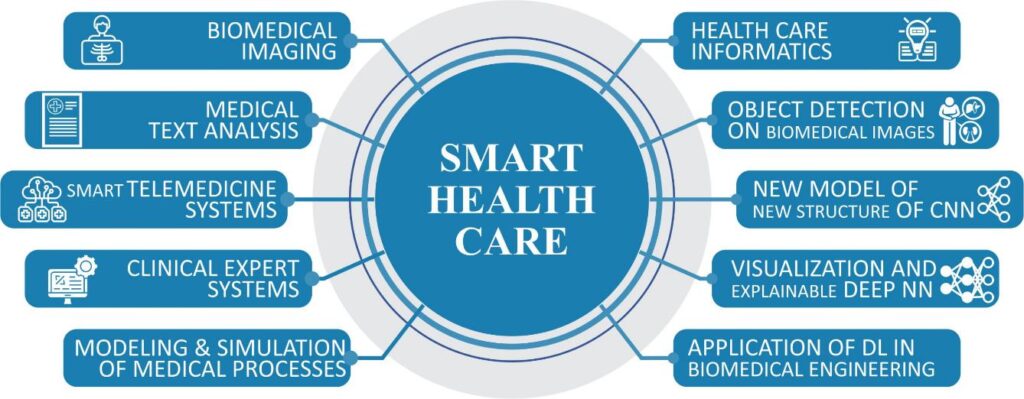Smart healthcare will use a new generation of information technologies, like artificial intelligence, the internet of things (IoT), cloud computing, and big data, to transform the conventional medical system in an all-around way, making healthcare highly effective, more personalized, and more convenient. Evolutionary Computing on Smart Healthcare Applications aims to be a forum where researchers, practitioners and industry representatives can present and discuss ongoing work and latest research results of meaningful contributes and systems in smart health care using evolutionary computing approaches. The concept of smart healthcare has seen a gradual increase with the expansion of information technology. Smart Health is a field which grows as a subsection of two fields, Electronic Health (e-Health) and smart cities cities. Smart cities are defined as cities strongly originated on information and communication technology that invest in social and human capital for enhancing the standard of life of people by efficient mobility participatory governance, sustainability and wise management of resources, at the same time they guarantee the security and privacy of the people. Depending on computer technology and large biomedical data, computational medicine was a disciplinary subject merging mathematics, medicine, biology, computer science, and many more. It employs the technique of artificial intelligence (AI) to perceptively comprehend the principle and physiological system of human illnesses through analyses in big data. It offers valuable data and direction for disease estimation, medical services, and clinical diagnosis. Evolutionary Computing covers a number of nature-inspired computational methodologies, mainly artificial neural networks (ANNs), fuzzy sets, genetic algorithms (GAs), Swarm Intelligence, and their hybridizations for addressing real-world problems to which conventional modeling can be useless due to several reasons such as complexity, existent of uncertainties, and the stochastic nature of the processes. Given the success of evolutionary computing methods and techniques in health care applications, it is expected that they can also be applied successfully to solve the medical issues. The focus of this workshop is to carry out the research article which could be more focused on Smart Healthcare Applications, it is expected that they can also be applied successfully to solve the medical issues based on Evolutionary Computing
Topics of interest include, but are not limited to, the following:
- Exploring the application of quantum computing in healthcare.
- Evolutionary Computing for recommendation in healthcare
- Medical imaging
- Biomedical imaging and image processing
- Medical text analysis
- Smart telemedicine systems with computational intelligence methods
- Clinical diagnosis and therapy
- Clinical expert systems
- Modeling and simulation of medical processes
- Health Care Informatics
- Application of deep learning in biomedical engineering
- Transfer learning and multi-task learning
- Joint semantic segmentation, object detection on biomedical images
- New model of new structure of convolutional neural network
- Visualization and explainable deep neural network
Guest Editors
- Professor Dr. Qammer Abbasi, University of Glasgow, UK, Qammer.Abbasi@glasgow.ac.uk
- Dr. Waqas Haider Bangyal, Kohsar University Murree, Pakistan, waqas.bangyal@kum.edu.pk
- Dr. Yu Zhou, Associate Professor, Shenzhen University, China, yu.zhou@szu.edu.cn
- Dr. Eneko Osaba, TECNALIA Research & Innovation, Spain eneko.osaba@tecnalia.com
Key Dates:
- Deadline for Submission: 30 June, 2024
- First Reviews Due: 05 August, 2024
- Revised Manuscript Due: 01 Sept 2024
- Final Decision: 01 Oct 2024

